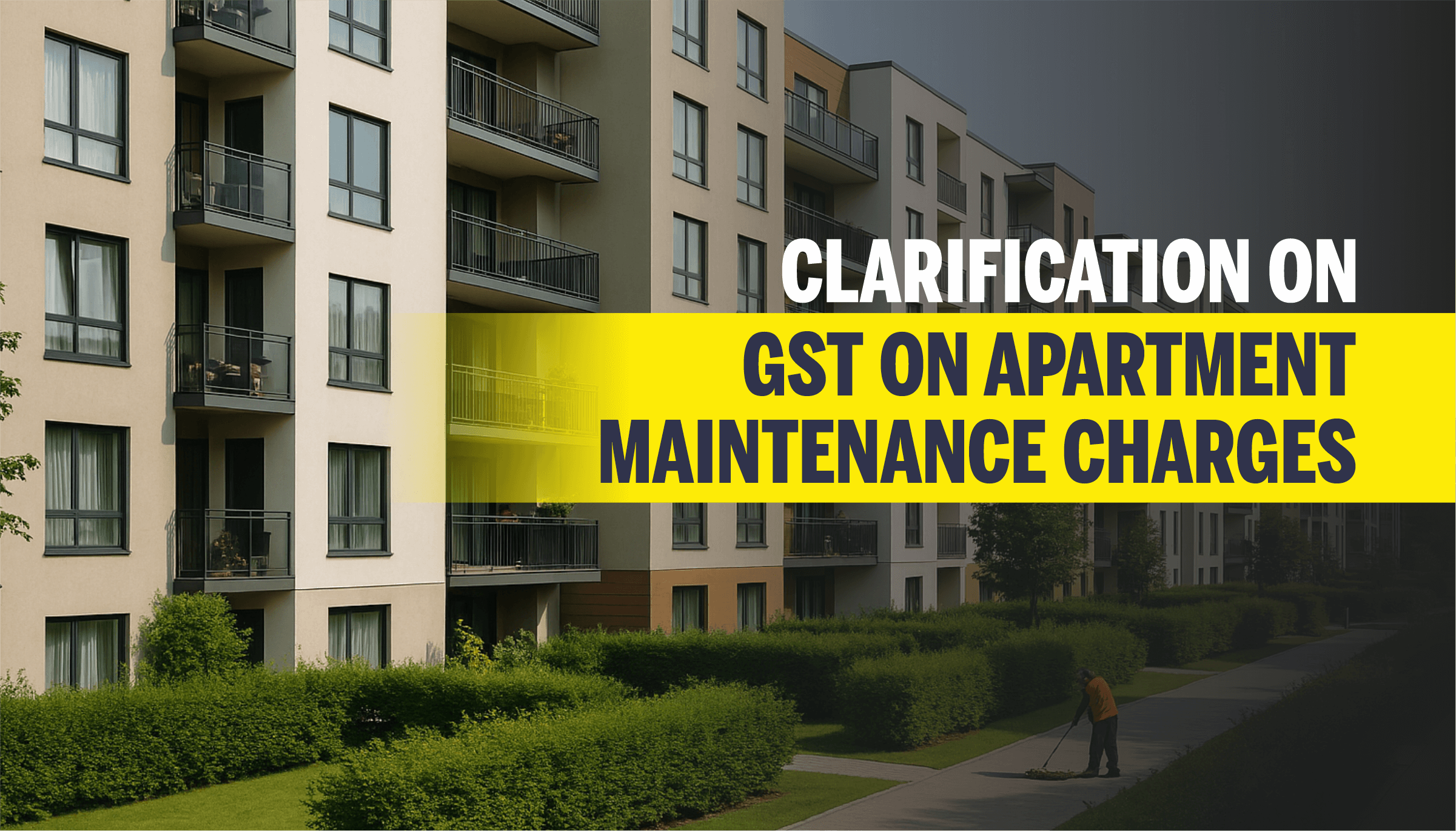Clarification on GST on Apartment Maintenance Charges

On July 28, 2025, Finance Minister Nirmala Sitharaman provided long-awaited clarity in the Lok Sabha on a question that has puzzled thousands of apartment residents and housing societies since the inception of GST: does GST apply to apartment maintenance charges, and who bears the responsibility for compliance?
Responding to Starred Question No. 109, the Finance Minister confirmed that residents have no compliance burden under GST, irrespective of how much they pay in maintenance. Instead, the onus lies entirely with the apartment associations, and only in certain cases. This statement — simple, direct, and grounded in existing law — now finally settles the confusion that persisted despite earlier notifications and circulars.
Understanding the Core Issue
Ever since GST was introduced, apartment maintenance charges have existed in a legal grey zone for many. Housing societies were unclear about whether they needed to register, whether they could claim exemptions, and whether the ₹7,500 threshold applied per member or to the entire society.
Residents, on the other hand, were often unsure if they were supposed to collect certificates or ensure compliance on behalf of the society. The result was inconsistent practices across states and cities — some RWAs over-complied, others under-reported, and many simply avoided dealing with GST altogether out of fear or confusion.
What the Law Says And What the FM Reconfirmed
As per existing GST provisions and exemption notifications, services provided by an apartment association to its own members are exempt from GST if the maintenance charged is up to ₹7,500 per month per member and the association’s aggregate annual turnover is below ₹20 lakh (₹10 lakh in special category states).
If both these thresholds are breached, that is, if the charges exceed ₹7,500 per month per member and the association’s turnover crosses the limit, then GST at 18% becomes applicable. Importantly, GST applies on the entire amount, not just on the portion above ₹7,500.
The Finance Minister also clarified that there is no requirement to obtain a GST exemption certificate. The exemption is automatic, and no resident or association needs to apply for or produce documentation to prove non-liability.
Communication and Awareness Efforts
Over the years, the Ministry of Finance and the CBIC have issued multiple communications to address this issue. These include Circular No. 109/28/2019, as well as press releases dated 13 July 2017 and 7 February 2018. Various awareness programs like Taxpayer Samvad, workshops, and sessions at GST facilitation centres have been conducted to educate apartment associations and ensure smoother compliance.
Despite these efforts, the misunderstanding persisted, which makes this fresh parliamentary clarification especially valuable. It not only reinforces the legal position but also gives it renewed visibility in public discourse.
Legal Standpoint and Key Precedents
The exemption limit was originally set at ₹5,000 per month but was increased to ₹7,500 following the 25th GST Council meeting held in January 2018. While this change was formally notified, its on-ground implementation remained patchy.
There have been a few legal cases on this subject. Notably, in Greenwood Owners’ Association vs. Union of India (Karnataka High Court, 2018), the court upheld the applicability of GST on charges exceeding ₹7,500. It reinforced the view that such maintenance charges constitute a taxable “supply” under GST when thresholds are breached.
However, courts have generally respected the GST Council’s recommendations and left scope for the government to refine or relax provisions via circulars and legislative action.
Relief for Past Non-Compliance
For apartment associations that may have defaulted in the early years of GST, whether due to ignorance or procedural delays, the government has offered a practical remedy. Section 128A of the CGST Act, introduced through Notification No. 21/2024, allows apartment associations to make good on past dues (specifically for the period from 1 July 2017 to 31 March 2020) by paying the pending tax amount without facing heavy penalties or interest.
This amnesty-like provision is available until March 31, 2025, and offers a fair opportunity for societies to come clean and regularize their position without inviting legal scrutiny or financial stress.
What This Means for Residents and RWAs
For residents, this clarification brings immediate relief. If you’re paying ₹7,500 or less as monthly maintenance, you are automatically exempt from GST, and no action is required on your part. Even if your charges are higher, it’s your apartment association’s responsibility to assess, register, and comply, not yours.
For apartment associations, however, this is a reminder to audit their turnover, review their monthly charges, and determine whether GST registration and collection obligations apply. If you meet the criteria, compliance is non-negotiable. If not, no GST needs to be charged, and no registration is necessary.
Final Word: Clarity That Empowers
The Finance Minister’s clear, structured reply in Parliament should put to rest any remaining doubts. The law, as it stands, is not burdensome but lack of awareness or inconsistent application had made it feel that way.
This clarification re-establishes the balance between intent and interpretation. It empowers residents to stop worrying about compliance they don’t owe, and guides apartment associations to step up where needed. And for those with past mistakes, there’s still time to make it right.
In the evolving journey of GST, this is a timely reset. Let’s use it well.
